How to Get the Best Deal on a Used Car [2024 Edition]
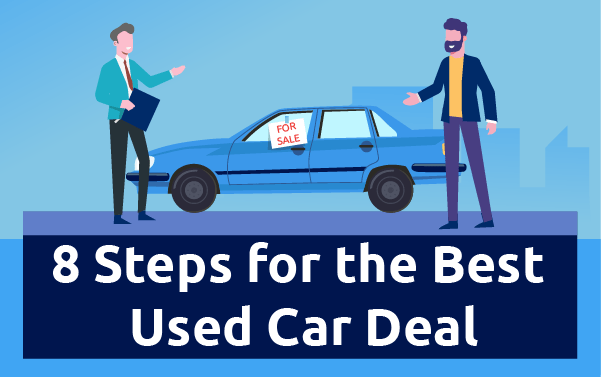 The simplest way to save money on a car is to buy a used model. New cars depreciate (go down in value) roughly 10% the moment you drive off the lot and 20% in the first year.
The simplest way to save money on a car is to buy a used model. New cars depreciate (go down in value) roughly 10% the moment you drive off the lot and 20% in the first year.
Aside from being more affordable, a used car will save you money on insurance, registration, and taxes.
In this guide, you're gonna learn all the red flags to avoid and how to negotiate the best possible used car price.
Table of Contents
- What Is the Best Way to Buy a Used Car?
- Step 1 - Set a Budget & Determine How Much You Can Afford
- Step 2 - Search Used Car Listings
- Step 3 - Check the Car's History and Condition
- Step 4 - Test Drive the Car
- Step 5 - Avoid Used Car Scams
- Step 6 - Know the Car's Market Value
- Step 7 - Get Used Car Financing
- Step 8 - Close the Deal - How to Negotiate Used Car Price
- When is the Best Time to Buy a Used Car?
- Frequently Asked Questions
What Is the Best Way to Buy a Used Car?

Unfortunately, you can't negotiate used cars the same way you negotiate new cars. It's not as easy to make car dealers compete with each other.
That's because used cars are each unique with different mileage and wear and tear. Unlike new cars which are identical in every way except for the price. But you can still save money buying pre-owned.
The best way to buy a used car is to follow these three principles:
- Don't limit yourself to a specific make and model. If you expand your search to a type of vehicle (like an SUV or a mid-size pickup) you'll have more options and find lower prices.
- Thoroughly evaluate a car with a vehicle history report, inspection, and test drive. You need to know what the car is really worth and avoid any maintenance issues or a troubled past.
- Prepare in advance for negotiations. Take the right steps BEFORE making an offer and you'll end up paying much less for the car and your financing.
Let's dive into the specific steps to help you get a good used car deal.
Step 1 - Set a Budget & Determine How Much You Can Afford
 Before you start car shopping it’s a good idea to have a price range in mind for the total cost of owning a car. That includes both the price of the vehicle as well as your monthly car budget.
Before you start car shopping it’s a good idea to have a price range in mind for the total cost of owning a car. That includes both the price of the vehicle as well as your monthly car budget.
Budgeting Rule of Thumb: Geoff’s Rule of 20
I recommend trying to put up at least 20% of the purchase price as a down payment and keeping your monthly car allowance to no more than 20% of your net pay.
When determining your monthly car allowance, consider all of these items:
- your monthly loan payment
- gas and tolls
- car insurance
- maintenance (an amount set aside for repairs, new tires, brakes, oil changes, etc)
Down Payment Budgeting
If you can afford to buy a car with cash outright, then great! But if you are getting a loan, you will still need to pay some money upfront.
Most used car loans require a minimum of 10% down payment either in cash or applied from your trade-in. Any less, and you could become upside down on your car loan as the car depreciates. This means you could owe the lender more than the car is worth. If you try to sell a car while you are upside down on the loan, you’ll need to pay the bank the difference between the sale price and the loan balance.
If possible, I prefer a down payment of at least 20% of the purchase price. And the more you put down, the less interest you will pay over the life of the loan.
Monthly Payment Budgeting
If you are getting a used car loan...
DO: Figure out what your monthly payment would be using a loan calculator and current “market rate” loan rates.
DO NOT rely on a car dealer to tell you the monthly payment.
Car dealers will manipulate you to focus on your desired monthly payment, but that’s a mistake. They can juggle other factors like the loan terms to make you feel like you are getting a deal when you’re actually getting ripped off.
Take for example a $15,000 car loan with different loan terms. While the first deal below has a monthly payment that’s $90 less, you’ll end up paying $1,456 more over the life of the loan.
| Monthly Payment | Loan Rate | APR | Total Cost of Loan (OTD) | Best Deal? |
| $242 | 72 months | 5% | $17,393 | |
| $332 | 48 months | 3% | $15,937 |
The moral of this story is to figure out what car price and monthly payment you can afford yourself. Don’t discuss financing with a car dealer until after the price is settled (more on negotiating financing later).
Step 2 - Search Used Car Listings
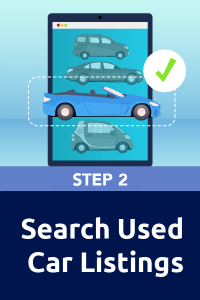 Where do you start when looking for a used car? There's no real magic to this step, just figure out your budget, your preferred car type, and start combing through listings.
Where do you start when looking for a used car? There's no real magic to this step, just figure out your budget, your preferred car type, and start combing through listings.
Rather than limiting yourself to a specific make and model, it's much better to start your search for a body type like coupe, truck, or SUV. By casting a wider net, you're more likely to find good options in your price range.
Try the search box in this section and also our partner CarsDirect.
Where to Buy a Used Car (8 Types of Used Car Dealers)
When searching for used cars, you’ll come across different types of used car dealerships. Here’s a quick breakdown of the most common places where you can buy a used car.
1 - New Car Dealerships (selling a single car brand)
Franchise new car dealerships (those connected with specific manufacturers like Ford, Honda, or Toyota) often sell pre-owned vehicles as well as new cars. If you’ve settled on a particular brand, these will give you the most options and frequently come with the peace of mind of a manufacturer warranty in a “certified pre-owned” (CPO) vehicle. The downside is that new car dealerships will usually charge you the most money.
2 – Independent Used Car Dealerships (selling multiple car brands)
Traditional used car dealerships carry a wide variety of brands and provide you the luxury of being able to browse a big selection in person and kick the tires. These dealerships aren’t tied to a specific brand.
3 – Used Car Superstores (selling multiple car brands)
These are similar to independent dealerships but are much bigger and often part of a chain of dealerships. CarMax and CarSense are good examples of superstores. An advantage of shopping through a chain is you can order vehicles from other locations. Plus, their cars are typically held to higher standards than independent dealers.
4 - Online Used Car Dealerships (selling multiple car brands)
Carvana, Vroom, and CarMax specialize in selling used cars over the Internet, including home delivery. Carvana and Vroom are online-only (unless you want to pick-up from a Carvana Vending Machine) while CarMax is a hybrid and has physical locations as well. These used car websites all allow you to get financing, a trade-in appraisal, and reserve a vehicle online. The downside of Carvana is that they do not allow traditional test-drives; instead, you have a few days to return the car after you buy.
See the value or buy a used car at Carvana >>
5 - Craigslist and Facebook
These are free marketplaces where individuals can post their used cars for sale along with lawn mowers, snow globes, pool tables, and anything else you can think of. You can often find good deals on Craigslist and Facebook, but they have no protections or quality controls in place. You are also on the hook to find your own financing. With these marketplaces, you’ve got to be extra careful to avoid lemons, scams, and stay safe meeting strangers. Don’t be surprised when you discover some of the listings are used car dealers pretending to be private sellers.
6 - Private-Party Sellers
While you can find individual sellers on Craigslist, it’s safer to shop on platforms that have some quality control. You can find private sellers on AutoTrader, CarGurus, AutoTempest, Cars.com and many more websites. Lots of these sites require a listing fee to weed out bad apples and come with vehicle history reports.
7 - Buy Here, Pay Here Dealers
BHPH dealers target consumers with bad credit and limited financing options. They offer bad-credit loans and guarantees for any credit score. The majority of these dealerships are predatory and push high-interest loans that are double or triple the market rate. Many loans given to cash-strapped buyers end in default and repossession (an extra source of profit for the dealer).
8 - Rental Car Fleet Sales
Several rental car agencies like Hertz, Budget, and Enterprise sell their fleet vehicles after they’ve been used for a few years. You can find deeply discounted cars, but beware, they’ve definitely been previously driven by many, many drivers and likely put through the ringer.
Once you've found a car you like, then it's time to make sure the car is in good condition.
Step 3 - Check the Car's History and Condition
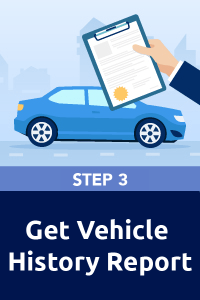 To spare yourself a major headache, ask questions and verify a used car's history and condition before making an offer.
To spare yourself a major headache, ask questions and verify a used car's history and condition before making an offer.
Take a lesson from car dealers who purchase used cars every day. They always run a vehicle history report on your trade-in before they buy it, and you should do the same. A vehicle history report will let you know if the car has been in a major accident, salvaged or reconstructed, stolen or was a lemon.
Many online used car listings include a link to a free vehicle history report. Otherwise, you should purchase a vehicle history report for any used vehicle you are seriously considering. The two main providers of vehicle history reports are CARFAX ($34.99) and Autocheck ($29.99). Each service also offers a deal to check multiple cars, which may be your best bet while used car shopping.
Review a Vehicle History Report
Some information to review in the report is:
- Accident history. Look for any major accidents.
- The total number of previous owners. Typically, it’s best to opt for used cars with few owners, as cars that change hands frequently may have an underlying problem. The report also tells you if the car was used as a fleet or rental car, which will help your negotiating position.
- Mileage. Confirm that the mileage in the report matches that of the listing.
- Manufacturer recalls. It will tell you if recalls exist and if they have been addressed or not.
- Title status. It’s crucial to confirm the status of the title. If the car was in a serious accident or faced flood/fire damage that rendered it totaled by the insurance company, it may have a salvage title. The salvage title drastically lowers the resale value. You should also ensure the title matches the name of the person/ entity trying to sell the vehicle and that there are no liens on the vehicle.
- Maintenance. Some reports show maintenance history for required maintenance as well as where the work was performed.
If something turns up when you run the report, you can avoid a costly mistake and skip making an offer. But if you still want the car, before you make an offer show the seller a printed copy of the report, and point out any issues that will help you justify a lower price.
For more information, learn how a vehicle history report works. And we've found that VinAudit has the cheapest reports at $9.99 each.
Get an Inspection
It's also important to get the car inspected by a certified mechanic to catch any other issues that may not have been reported. Most auto repair shops will do a comprehensive inspection for $50-$150. Look for AAA or CAA discounts on inspections as well.
Spending a little now to check up on a car has the potential to save you a lot in the long run. When buying off eBay or over long distances, the seller will often agree to arrange this for you if it means you're likely to purchase the vehicle. Just make sure a reputable shop performs the inspection.
Step 4 - Test Drive the Car
 Test driving the car will give you a good idea if the model and features are a good fit for you. It will also give you a chance to check for any obvious problems and to make sure you like how the vehicle drives. The test drive can help you decide if it is worth having an independent mechanic inspect the vehicle.
Test driving the car will give you a good idea if the model and features are a good fit for you. It will also give you a chance to check for any obvious problems and to make sure you like how the vehicle drives. The test drive can help you decide if it is worth having an independent mechanic inspect the vehicle.
Select a versatile test drive that goes over rough pavement, winds through curves, takes on hills, and even hits the highway. Keep the radio off so that you can listen to the car closely.
Some things to pay attention to on the test drive include:
- Blind spots. How is the visibility while driving and changing lanes?
- Power. How does the vehicle handle acceleration and cornering? Is there good power and grip with the steering wheel?
- Brakes. How do the brakes function?
- Comfort. How does the vehicle feel to drive? Can you reach all of the controls?
- Mechanical condition. Do you hear unusual noises or feel strange vibrations?
- Cargo capacity. Following the test drive, examine the back-seat passenger space and cargo room.
- Sound system. Before turning the car back in, check the sound system and make sure Bluetooth works (if it’s available).
Step 5 - Avoid Used Car Scams
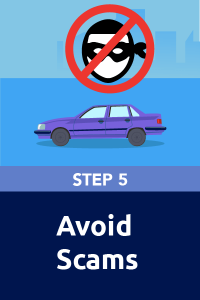 When buying a used car, you must be careful to do your research and avoid common used-car scams.
When buying a used car, you must be careful to do your research and avoid common used-car scams.
Types of Scams
Here are some scams to watch out for:
- Curbstoning. This is when car dealers pose as private sellers to avoid FTC rules. They post ads on classified sites and pretend to be a private owner looking to sell. Curbstoning is against the law, and these people often sell vehicles with serious hidden problems.
- Fake Escrow. Some “sellers” create fake websites that pose as escrows. They post used cars for prices too good to be true and convince buyers to send money to “escrow”, but the money just goes to the seller. Once they get the money, they vanish and you cannot reach them again.
- Title washing. Vehicles with salvage titles have lower value, so some sellers will “wash” the title by sending the car to another state that doesn’t recognize the salvage brand.
- Odometer fraud. Digital odometers can be tampered with. Some people (and even shady dealers) will reprogram the odometer to make the mileage seem lower on the car.
- Fake Certified Used Cars. Certified Pre-Owned (CPO) cars are only sold via franchised dealers. These cars are manufacturer-backed and include a multi-point inspection with an extended warranty. Beware of fake “certified used cars” that independent used car lots may attempt to pull.
Tips to Avoid Scams
Used car scams can cost buyers thousands of dollars, and they are a huge waste of time. To get a legitimate, quality used vehicle, you must avoid these scams.
Here are a few tips for avoiding used car scams:
- When buying from a private party, do not send money through unsecured payment networks like the Western Union. Always use an escrow service.
- Be sure to get a vehicle history report whether you are buying from a dealer or a private party.
- Compare odometer mileage with the mileage on the vehicle history report.
- If buying from an individual, ask to see the seller’s ID along with the car title to verify the names match. This will also help you catch title washing.
- Verify that any certified used car is backed by a manufacturer program.
Step 6 - Know the Car's Market Value
 Before you make an offer on a used car, you need to know the car's value. The price the seller puts in the window is not likely to be the market value. It's only a starting point for negotiations.
Before you make an offer on a used car, you need to know the car's value. The price the seller puts in the window is not likely to be the market value. It's only a starting point for negotiations.
Here are some factors that affect the value of a car:
- Year. Some manufacturers make drastic changes in a certain year, so even a couple of years can mean a big price difference.
- Make and Model. Look for cars that are the same model or trim level to accurately compare pricing.
- Options. Special added features may also raise the value of the vehicle.
- Mileage. The average annual mileage for a car is roughly 12,000 miles. The price will move up or down if the car was driven significantly more or less than this.
- Condition. Whether the car is in good shape will greatly impact the value.
Note: A seller will often price their car based on an "Outstanding" condition, but there are almost always small dents, scratches, and wear and tear that make the car in less than perfect condition. Be sure to detect and point out these flaws to the seller and explain that they should be reflected in the price.
There are two easy ways to get a realistic estimate of how much you should pay:
- Lookup the car using the Edmunds.
- Search similar listings in other cities on CarsDirect and find a comparable car that has a lower selling price.
Check out our full comparison of Black Book, Edmunds, and Kelley Blue Book here.
Bring printouts of both of these items and use them as proof the seller is asking too much.
Forget about the seller's initial price, just give a realistic bid. If you have documentation that your bid is in line with market prices, it's very difficult for a seller to argue the facts.
Step 7 - Get Used Car Financing

If you’re able to buy the car in cash, then great! You can skip this section. However, most used car buyers will still need a loan to pay for the vehicle.
Whether you're buying from a used car dealer or private party, finding competitive online financing is the key to saving money on your loan.
If you're buying from a used car dealership, use the same approach you would use to finance a new car:
- Know your credit score. Lenders use your credit score to assess your level of “risk”. With a higher credit score, you are likely to get better rates. It may be worth raising your credit before applying for loans if your credit is low.
- Get pre-approved from an online lender like SuperMoney. You can apply for several online lenders to find the best rates. Or, if you have bad or no credit, then try Auto Credit Express.
- When you talk to the Finance Manager, give them a chance to beat the best interest rate you found. The Finance Manager works on commission and will usually try to beat or match your best rate if you give them a chance. Ask what kind of rate they can give you and don't be embarrassed to show your outside lending quote. If they cannot match it, feel free to use your outside financing.
Step 8 - Close the Deal - How to Negotiate Used Car Price
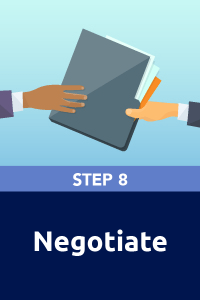
If you follow the steps above you'll be better equipped to make an offer on a used car. You'll know the true value of the car and be able to back it up with documentation.
Bring these items with you to make your point.
- A printout of a vehicle history report, along with any notes about the report that warrant a lower offer than the sticker price.
- A printout of the Edmunds car appraisal
- A printout of any comparable listings you've found at lower prices in other cities.
- A preapproved loan, or enough cash for the vehicle. Negotiating as a monthly payment buyer will make it more difficult to settle on the sale price of the car.
Prompt for an Offer
Always attempt to get the other person to make the first offer. You could open by stating that you’ve done a lot of research about the prices people pay for this car and then ask what discount they are offering.
In some cases, you may still have to make the first offer. If so, set your opening offer lower than the market value price but still reasonable. Once you state your offer, just wait for a response. If they are quiet, don't feel like you have to throw out a second offer and negotiate against yourself. Silence can be painful but wait them out.
However, if you are negotiating with a private party then be careful of making too low of an offer. Consider asking for their best price instead, giving them a chance to negotiate against their own listing price.
Avoid Dealer Traps
If you’re shopping at a dealer lot, be aware of the many dealer traps that can cause shoppers to pay more.
- Don’t get stuck in the office while someone “goes to talk to their boss”. Get up and walk around the showroom to show you won’t be controlled.
- Repeat numbers. There’s no need to rush through a negotiation. Take your time. Repeat the numbers you hear. Write them down if you need to.
- Negotiate the out the door price if you are at the dealership. Don't negotiate the monthly payments or even the sticker price. To do this, you must ask directly what the out the door price is.
- Ask about fees. Before signing any deal, make sure you know all of the fees and ask for a breakdown before agreeing.
- Keep it simple. When you near an agreement, many dealers try to add extras that are difficult to quantity.
- Get it in writing. Don’t rely on verbal promises. Get the deal in writing and review it again, whether you're negotiating with a private seller or a dealership.
Tips for Private-Party Deals
When you negotiate with a private party, you can deal directly with the decision-maker and avoid some of the dealer hassles. However, you cannot always be sure that private sellers chose a price based on market value.
Refer back to the Edmunds car appraisal and other market prices you’ve seen when negotiating. Justify your price with a reason if it is well below the seller’s price.
Be Willing to Walk Away
Never come in as a desperate buyer with your heart set on the vehicle. It will cloud your vision and can lead to paying more than you should.
Ask for a fair price based on these things and don't be afraid to walk away if you can't get the deal you want. Different used cars come on the market every day and there will be plenty of other choices if you take your time.
When is the Best Time to Buy a Used Car?
The best time to buy a used car is the beginning of the month. Interestingly, this is the opposite of new cars where it's best to wait until the end of the month to catch salesmen when they are trying to hit their sales goals.
The reason used cars are different is because dealers update their inventory on used car websites and search engines like the one below at the beginning of the month. As the month goes on, there is less selection to choose from and demand for the remaining vehicles goes up.
You can still find bargains from both dealerships and private sellers throughout the month, but you'll have more options if you start your search early.
Frequently Asked Questions
How much can you negotiate on a used car?
One of the main benefits of buying a used car is the ability to negotiate. In many cases, you can negotiate significantly on a used car and get a better deal than you expected.
What percentage of the asking price should I offer on a used car?
Most dealers ask for 20% more than they pay for a used car, so they normally won’t sell a quality vehicle for more than 20% off the asking price. Start by asking for 15% off of the asking price and then go from there.
Do used car dealers negotiate on price?
Used car dealers negotiate on price, especially for vehicles that have been in the lot for a while. They typically lower the price anywhere from one to six times in 30 days. Dealers will often be antsy to get cars off the lot that have been there for a while, so those offer the best chance for negotiation. However, be careful to ensure you are still getting a good quality vehicle with a clean title.
How old of a used car should I buy?
The age of a used car you should buy depends on your needs and the condition of the car. Mileage is a crucial consideration, you are better off getting an older car with very few miles than a newer one with excessive mileage. Overall, the recommendation is to look for cars younger than five years old, as cars tend to need more repairs as they age.
Where is the best place to buy a used car?
To find the best deal on a used car you should shop from a variety of sources. You can check: certified used cars from franchised dealers, used car dealerships, used-car websites like Carvana, private sellers on classified websites (Craigslist, Facebook Marketplace, etc.)
